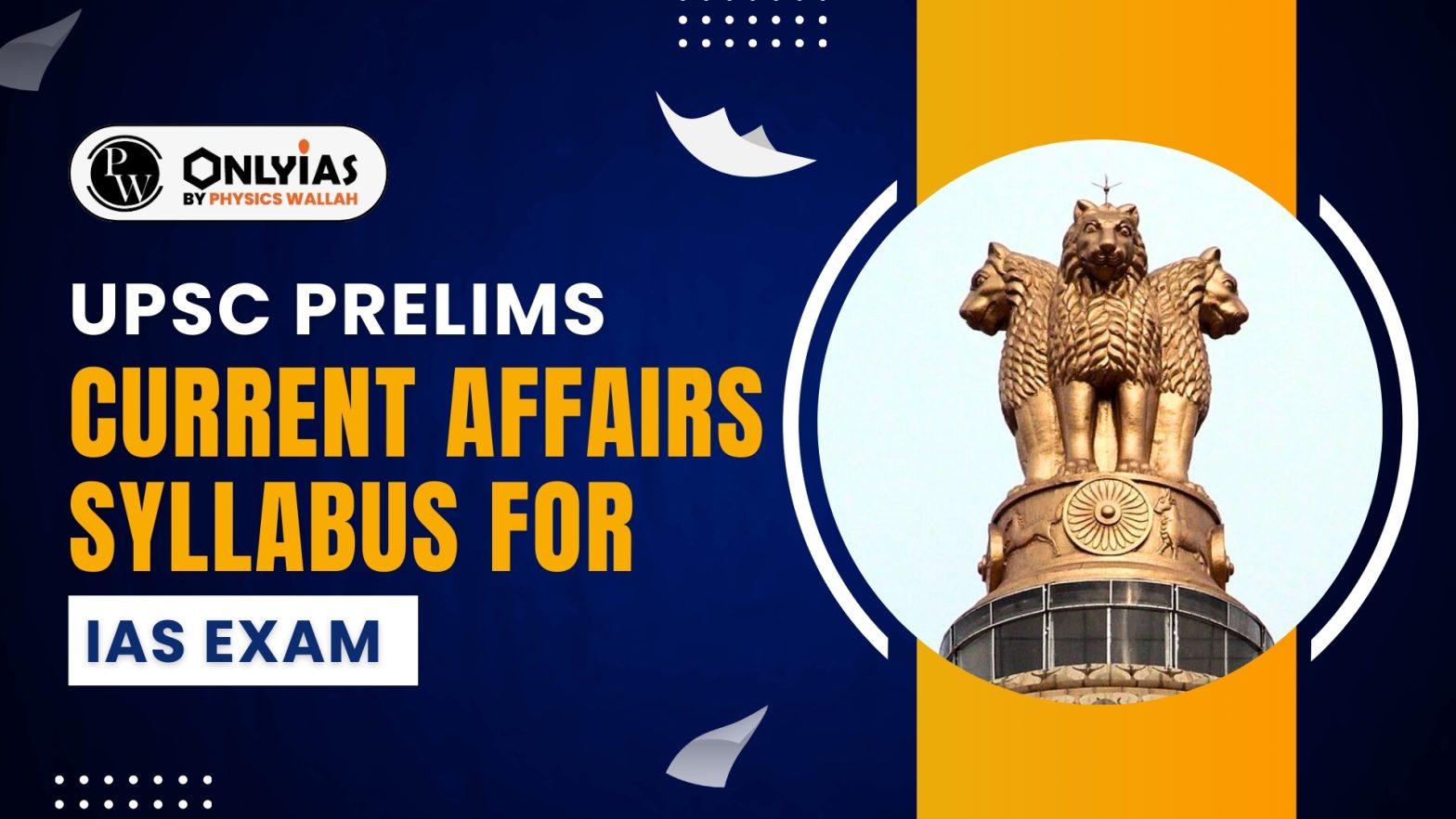UPSC Prelims Current Affairs Syllabus for IAS Exam 2026 is provided here in detail. Prepare for UPSC Prelims 2026 with a complete guide to the Current Affairs syllabus, including national, international, economic, environmental, and policy-related topics. Know the weightage, question trends, and essential sources like newspapers, reports, and government schemes.

The Union Public Service Commission Preliminary Examination, or Prelims, is the first stage of the Civil Services Examination conducted by the UPSC. The Prelims exam consists of two papers: General Studies Paper-I and General Studies Paper-II (CSAT), both of which are objective-type multiple-choice exams. Candidates need to stay continuously updated on national and international events, policies, and issues, as the UPSC Prelims often draws questions from dynamic areas like government schemes, international relations, economic developments, and environmental concerns.
Current Affairs plays a crucial role in the UPSC Prelims examination. The weightage of current affairs varies from year to year, but it typically has a significant impact on the exam. Based on recent years’ trends, the number of questions related to Current Affairs in the Prelims has ranged from 11 to 24 questions. The detailed UPSC Prelims Syllabus is provided in the table below:
Paper 1: General Studies
Paper 2: CSAT
UPSC prelims Current Affairs syllabus focuses on current events of national and international importance. While this does not directly tell us the types of questions asked, an analysis of previous year’s questions has given us some hints on the current affairs questions. The complete details of the UPSC Prelims Current Affairs syllabus are as follows:
Enroll now for UPSC Online Course
1. National Issues
2. International Issues
3. Sports
4. Awards
5. Economic Developments
6. Indian Polity Developments
7. Science and Technology
8. Committee, Report and Task Force
9. Environment
10. Security
11. Governement Schemes
UPSC prelims Current Affairs syllabus is not covered in any static books because it is not fixed. Candidates have to refer to newspapers and magazines to cover current affairs for UPSC prelims. Some of the Important sources for current affairs are as follows:
UPSC Prelims Current Affairs Sources
Newspapers
Annual Ministry Reports
Websites
Magazines
Miscellaneous
Editorials
In UPSC Prelims, current affairs have a significant weightage for UPSC prelims exam. So, if you are wondering how Current Affairs are asked In Upsc, some of the questions asked are static topics that have relevance due to recent events; other questions are directly based on recent events. The number of Current Affairs questions asked in the last few years are as follows:
Enroll now for UPSC Online Classes
Year of Preliminary Examination
Number of Current Affairs Questions
2025
15
2024
20
2023
15
2022
15
2021
17
2020
18
2019
22
2018
14
2017
15
2016
27
2015
22
2014
8
Current Affairs is indeed an important component of UPSC preparation. Candidates cannot score well by ignoring UPSC Prelims Current Affairs Syllabus. The syllabus of current affairs, according to UPSC, is very generic and vague. This increases the scope of asking random questions that may not resonate well with candidates. Hence, candidates must be prepared to tackle unexpected questions by covering all the topics mentioned above in the syllabus.
The UPSC Prelims 2026 are scheduled to take place on May 24, 2026. The format of civil services exams has changed annually, especially in the previous five to six years. The relevance of current affairs varies year to year, so staying up to date on current events is essential.
Preparing current affairs for UPSC Prelims 2026 requires a focused and consistent approach. Aspirants should rely on limited, high-quality sources and revise them multiple times. Daily updates help in understanding national and international developments, government schemes, reports, and socio-economic issues relevant to the exam.
To strengthen current affairs preparation, candidates should follow PWOnlyIAS Daily Current Affairs, PWOnlyIAS Daily Editorials, and the PWOnlyIAS YouTube Channel, which provide crisp analysis, Prelims-focused MCQs, and Mains-oriented explanations. Regular revision, monthly compilations, and mock tests will further boost accuracy and confidence for UPSC Prelims 2026.
Join UPSC courses from Physics Wallah to increase your chances of cracking UPSC 2026. Enroll now!
Check Out UPSC CSE Books
Visit PW Store
The major source of current affairs is the newspaper. Apart from newspapers, candidates can also read magazines such as Down to Earth, Kurukshetra, Yojana, Ministry reports, budget documents, etc.
Yes. Candidates are advised to make their own notes on current affairs. This will help them retain content and also cover most of the important topics.
Yes. Many candidates subscribe to any reputed current affairs magazine and read it to cover current affairs syllabus. However, current affairs magazines are not a substitute for newspapers.
Even though there is no fixed way of reading current affairs, candidates are not advised to cover whole current affairs at a time, as it will reduce scope for revision.
No. UPSC asks questions beyond newspapers, and hence candidates are advised to read current affairs from other sources such as magazines, ministry reports, budget etc.
<div class="new-fform">
</div>